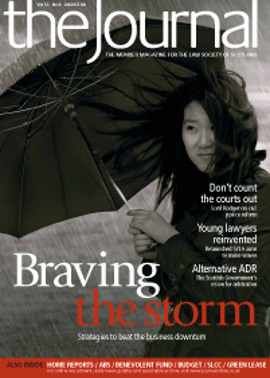A rank bad rule

We have argued for some years that the Faculty of Advocates needs to embrace modern business practices if it wishes to thrive.
The advocate’s business model is a commercial anomaly which is very difficult to justify in business terms. Advocates cannot incorporate; they cannot harness tax and other efficiencies of alternative business models; they cannot sue for their fees; they cannot properly compete with solicitor advocates or barristers; and they are inhibited from developing their services by arcane practice rules with origins in the 18th century.
Commercial clients struggle to understand the purpose of some of our professional rules. It is difficult to explain to them in a cogent way that rules which are relics of the past and unfit for purpose are in their interest.
Advocates are bound into a system of practice which is no longer relevant to modern conditions, and in our opinion hampers the evolution of an environment conducive to the development of excellence.
In May the Faculty of Advocates published its paper “Access to Justice – A Scottish Perspective – A Scottish Solution” (Journal, June, 37), in response to the OFT’s request, following the Which? supercomplaint. In that paper Faculty based its resistance to alternative business structures (“ABS”) principally on maintaining the “cab rank rule”, arguing that “one of the core values of... an independent referral bar is... the cab rank rule”.
We submit that Faculty’s reliance on this rule is misplaced. There are far better reasons for having a truly independent bar than reliance on a rule which is meaningless.
The “rule” exists on paper only. In reality it is a polite fiction. There are now so many exceptions to this so-called rule that it has no practical effect. Any advocate can decline work if he or she does not wish to do it, for reasons which may or may not have any real content. There is no basis for questioning such a decision. In any event there is no obvious demand for a cab rank rule from the users of legal services. The rule serves no purpose other than to attach a meaningless label to distinguish those practising at
the bar from solicitors and solicitor advocates. Yet the Faculty seems to rely on it. There are now so many lawyers with extended rights of audience, that supply comfortably exceeds demand. In short, there is no evidence of unmet need for advocacy services, nor is there any need for a cab rank.Sir David Clementi recognised the fallacy of the rule, and the Bar Council of England & Wales subsequently abandoned its resistance to ABS on this ground. The Faculty of Advocates should do likewise.
On the wider issue of the adoption of ABS, the Faculty argues that ABS will “undermine access to justice”.
We think this is an extravagant contention. Any housepainter or hairdresser in the land can adopt a business format which suits his own trading requirements, and allows him to ply his trade to best fiscal advantage. But not advocates.
The Faculty’s answer to anyone wishing to adopt an ABS is that they should become a solicitor advocate. This high-handed approach misses the point. There are a number of advocates who now actively wish to adopt ABS. Some, for example, want to incorporate as a single member company. This simple step can result in significant cost efficiencies and tax savings, and would have no harmful effect whatsoever on the real key distinguishing feature of an advocate’s practice – his or her rigorous independence. The Bar Standards Board in England has acknowledged that there must be strong reasons to justify preventing individuals taking advantage of ABS if they wish to do so. Why are we so special and different in Scotland?
The Scottish legal world has recently seen a number of advocates joining legal firms, becoming solicitors or solicitor advocates. There is clear evidence that large clients north and south of the border now wish to be able to instruct counsel directly. The whole legal services market is undergoing immense change. We think that if the Faculty does not acknowledge these changes, and lead from the front, it will be doing a real disservice to its members, and will see them left behind and inhibited from competing for work – resulting in a smaller and less effective bar.
The Faculty’s answer to any challenge to existing rules is to review them yet again, and perhaps, one day, reform them. Experience suggests this will be a glacial process – recent reviews have resulted in few changes of consequence.
We believe that ABS will ultimately lead to lower costs, innovation and improved service levels. There is nothing to fear from the Scottish legal services market becoming a more competitive place. Current changes are a positive force for good and should be embraced, not resisted. We think it is a great pity that our professional body does not share our enthusiasm for modernisation and reform.
In this issue
- Where have we come from, where to next?
- Shifting sands
- A rank bad rule
- Braving the storm
- Civil justice: where next?
- Title Conditions Act: new registration procedures
- Young lawyers reborn
- Shining some more light...
- Power to the tribunal?
- Piece by piece
- The poor in our midst
- The Society's future role in complaints handling
- Appreciation: Lord Johnston
- Professional Practice Committee
- Facing the lean years
- It's a web 2.0 world
- Questions, questions
- Bare necessities
- Coming on the blind side
- Relocation, relocation
- Worse than the disease?
- Sleeping bounty
- Scottish Solicitors' Discipline Tribunal
- Website reviews
- Book reviews
- Industry standard
- Meet the committee
- What's in a motto?
- Leasing by example
- Good call?
- Home reports - the practice questions






